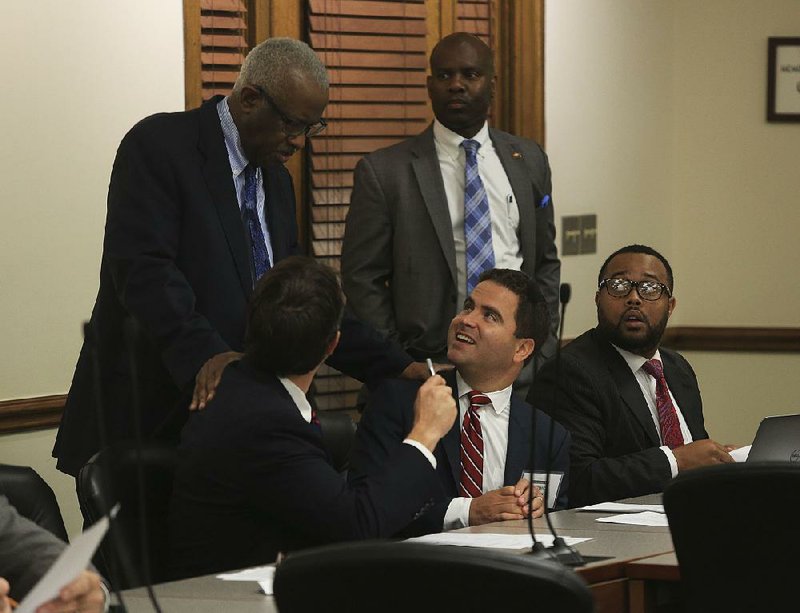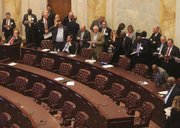Even though their ranks in the Arkansas House of Representatives dipped from 34 to 26 in Tuesday's election, Democrats will control the House Revenue and Taxation Committee in the next legislative session, with tax cuts expected to be a source of contention.
The House held a session Thursday to determine the order of seniority of newly elected members and make committee selections. All of the selections take effect Jan. 9, when the 91st General Assembly is sworn in and the regular legislative session starts.
The 20-member Revenue and Taxation Committee will consist of 11 Democrats and nine Republicans. The 100-member House will have 74 Republicans and 26 Democrats.
Democrats said Thursday that control of the House tax committee will allow them to influence decisions on whether the Legislature should cut taxes and, if so, which taxes to cut.
But the number of Democrats on the committee led Republican Lt. Gov. Tim Griffin, who served in the U.S. House of Representatives from 2011-15, to tweet that it's "an affront to voters and outrageous. Unacceptable."
Some House Republican leaders said they would have liked fellow conservatives to be the majority on the committee but acknowledged that Democrats had won the spots fairly.
Under House rules, each of the House's four congressional district caucuses selected five members for the committee. While the rules don't specify how the caucuses select the five members, the practice has been for the caucuses to allow their members to choose on the basis of seniority and that's how the committee members were selected Thursday, House members said.
The House Revenue and Taxation Committee "reviews matters pertaining to the levy, increase, reduction, collection, enforcement and administration of taxes and other revenue-producing measures, and considers resolutions germane to the subject matter of the committee," according to Arkansas Code 10-3-203.
Bills initially are assigned to House or Senate committees for consideration. Those committees determine what bills move to the full House or Senate for votes. If a bill stalls in a committee, two-thirds of lawmakers can vote to extract it, although that power is rarely used.
"We're really interested in responsible tax policy moving forward," said House Democratic Leader Michael John Gray of Augusta.
"What Democrats are going to do is what they always do -- take a responsible look at the bills that come through. In this Capitol, there shouldn't be a political ideology driving fiscal responsibilities," he said.
Gov. Asa Hutchinson said Wednesday that he would ask the Legislature to enact a tax cut that would become effective in the last half of fiscal 2019. The tax cut, to take effect on Jan. 1, 2019, would reduce general revenue by about $25 million in fiscal 2019 and by $50 million the next fiscal year. He said he prefers cutting individual income tax rates, but he hasn't decided what tax cut he'll propose.
Sen. Bart Hester, R-Cave Springs, said he's aiming at a tax cut of more than $100 million a year by the end of the next biennium on June 30, 2019.
When asked about the Democrats on the committee, Hutchinson said, "I do not intend to get involved in the House committee selection process. They are a separate body of government, and I believe in the separation of powers and the checks and balances system that serve our country so well."
"I will continue to advocate for bipartisan support for both my balanced budget and the tax cuts that spur economic growth," the Republican governor said in a written statement.
"I think it's way too early to just automatically make those kind of assertions as to what the committee will do or won't do," said House Speaker Jeremy Gillam, R-Judsonia. "To this point, they have seen no legislation. I think we have to be fair and give the members a chance to actually see the bills and go from there."
He said that when he was a first-term representative in 2011 and 2012, Republicans were in the minority party, and they secured a majority on the House Revenue and Taxation Committee. The Republicans had 12 members on the committee, while the Democrats had eight, according to legislative records. The Republicans gained control of the House and Senate in 2013 for the first time since Reconstruction.
Rep. Charlie Collins, R-Fayetteville, who retained his spot on the Revenue and Taxation Committee, said he tips his hat to his Democratic colleagues for their committee selection.
"For some, like me, who believe we need a really, really large tax cut, it could complicate how that process unfolds," he said. "But at the end of the day, because we've got such a supermajority, when we get clarity on what we align to, we're obviously going to be able to go ahead and do that."
But Griffin said the House tax committee's makeup runs contrary to the will of the people after Tuesday's election.
He said practices need to be changed so seniority doesn't determine committee assignments.
"This policy is directly attributable to stopping policies in the last [2015] session such as education reform, tort liability reform, voter ID as well," Griffin said, referring to the House Education Committee and the Senate State Agencies and Governmental Affairs Committee that were half Democrats and half Republicans.
"We can debate whether to have certain policies but the idea that we would automatically let Democrats who barely have a quarter of the House -- much less a half -- that we would give them say over the governor's tax policy is completely outrageous."
But Greg Leding, D-Fayetteville, who will be a new member on the House tax committee, said it is important that the minority party have a say.
"We felt that our Republican colleagues were going to prioritize the Education and Public Health committees and so, with the limited numbers we have, we just did what made the most sense for us," he said. "Obviously anything that House Revenue and Tax passes would still have to get down to the Senate, but I think it gives us an opportunity to present responsible tax relief for Arkansans."
Asked about attempting to undo committee selections, Collins said rule changes can have unintended consequences.
"The rules of the game are laid out in advance," he said. "I like the idea of individuals being able to select their committee assignments. It gives each individual member his or her own opportunity to influence where they're going to apply their expertise. The kind of changes that would put all that power in limited hands -- I'm not sure they would be overall good or bad."
Besides, "elections do all the talking. At the end of the day, there are 74 Republicans in the House of Representatives," he said.
The Democratic members of the House Revenue and Taxation Committee will be: Leding; Reginald Murdoch of Marianna; Scott Baltz of Pocahontas; Eddie Armstrong of North Little Rock; Joe Jett of Success; Warwick Sabin of Little Rock; Monte Hodges of Blytheville; Kenneth Ferguson of Pine Bluff; Bob Johnson of Jacksonville; Vivian Flowers of Pine Bluff; and Michael John Gray of Augusta.
The Republicans on the committee will be: Collins; Jim Dotson of Bentonville; Ken Bragg of Sheridan; Joe Farrer of Austin; Dan Douglas of Bentonville; Kim Hendren of Gravette; Les Eaves of Searcy; and representative-elects Danny Watson of Hope and Les Warren of Hot Springs.
Committee selections in the Senate are to take place Wednesday.
Senate rules dictate that senators select their committees on the basis of seniority.
The Senate will have 26 Republicans and nine Democrats in January. In Tuesday's election, Republicans took two seats from the Democrats.
Senate Republican leader Jim Hendren, R-Sulphur Springs, said the House Democrats' securing 11 seats on the 20-member House Revenue and Taxation Committee is going to lead to more scrutiny of the Senate's rules.
He said he expects Senate Republicans to discuss the possibility of changing the Senate's rules next week so the minority party couldn't comprise at least half of a Senate committee.
Senate President Pro Tempore Jonathan Dismang, R-Searcy, said he doesn't believe the Senate needs to make any rule changes regarding senators selecting their committees. He said senators are more focused on their individual interests and constituents in selecting their committees, and it's unlikely Democrats will make up at least half of a Senate committee.
It takes 18 votes in the Senate to extract a bill from a Senate committee and move it to the Senate floor.
After the 2014 election, when the number of Democrats slipped from 13 to 11 in the 35-member Senate, four Democrats decided to serve on the eight-member Senate State Agencies and Governmental Affairs Committee.
That led Sen. Eddie Joe Williams, R-Cabot, who was unsuccessful on his proposed amendment to change the state's tort laws in 2013, to tweet: "So much for tort," and Sen. Bryan King, R-Green Forest, to declare: "I have a better chance of winning a Brad Pitt lookalike contest than voter ID coming out of that committee."
Also, four Senate Democrats decided to serve on the eight-member Senate Judiciary Committee.
A Section on 11/11/2016


